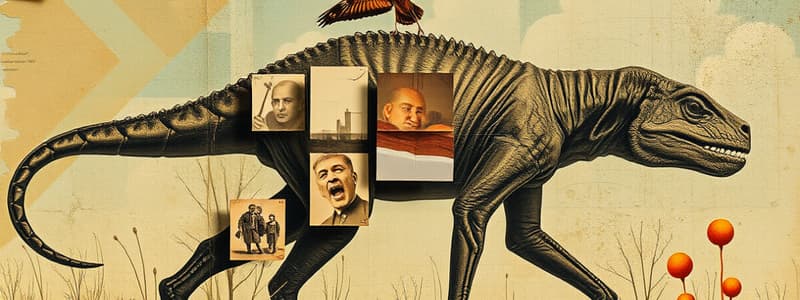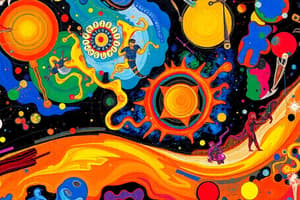Podcast
Questions and Answers
What is evolutionary biology?
What is evolutionary biology?
The study of the history of life forms on earth.
The universe is approximately ______ years old.
The universe is approximately ______ years old.
20 billion
The Big Bang theory explains the origin of the universe.
The Big Bang theory explains the origin of the universe.
True (A)
How long ago was the earth formed?
How long ago was the earth formed?
What gases covered the surface of early Earth?
What gases covered the surface of early Earth?
What theory proposed that life came from outer space?
What theory proposed that life came from outer space?
Spontaneous generation theory was proven to be correct by Louis Pasteur.
Spontaneous generation theory was proven to be correct by Louis Pasteur.
Who proposed the idea that life could have originated from non-living organic molecules?
Who proposed the idea that life could have originated from non-living organic molecules?
S.L. Miller created similar conditions to early Earth in a laboratory at ______ degrees Celsius.
S.L. Miller created similar conditions to early Earth in a laboratory at ______ degrees Celsius.
Flashcards are hidden until you start studying
Study Notes
Origin of Life
- Evolutionary Biology explores the history of life forms on Earth, encompassing changes in flora and fauna over millions of years.
- Understanding evolution requires knowledge of the Earth's origin and the early universe, including the formation of stars and galaxies.
- The universe is around 20 billion years old and consists of vast clusters of galaxies containing stars and gas clouds.
- The Big Bang theory describes the origin of the universe through a massive explosion that caused expansion and cooling, leading to the formation of hydrogen and helium.
Formation of Earth
- Earth formed approximately 4.5 billion years ago as part of the Milky Way galaxy.
- Early Earth lacked an atmosphere and was covered by water vapor, methane, carbon dioxide, and ammonia from its molten surface.
- Ultraviolet rays from the sun caused water to break apart into hydrogen and oxygen, allowing H2 to escape and enabling chemical reactions that formed the first water bodies.
- The ozone layer developed, and as Earth cooled, rain filled depressions to create oceans.
Emergence of Life
- Life is thought to have arisen approximately 4 billion years ago, about 500 million years after Earth’s formation.
- The idea of "panspermia" suggests that life, or its building blocks, may have originated from outer space, with early Greek philosophers proposing that spores traveled between planets.
- Historically, spontaneous generation was believed to cause life to arise from decaying matter, but this was debunked by Louis Pasteur, who showed that life emerges only from existing life.
- Pasteur's experiments illustrated that organisms arose from exposure to air rather than spontaneous generation.
Chemical Evolution
- Russian scientist Oparin and British scientist Haldane theorized that life began from pre-existing non-living organic molecules, leading to a process called chemical evolution.
- Conditions on early Earth included high temperatures, volcanic activity, and a reducing atmosphere rich in methane (CH4) and ammonia (NH3).
- In 1953, S.L. Miller demonstrated these conditions in a laboratory by creating an environment with CH4, H2, NH3, and water vapor exposed to electric discharge at 800°C, simulating early Earth’s conditions.
Studying That Suits You
Use AI to generate personalized quizzes and flashcards to suit your learning preferences.




